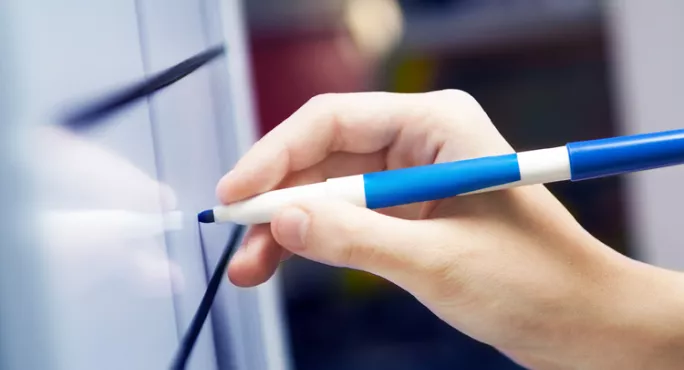I love mini-whiteboards. I am unapologetic about this obsession (even though I do occasionally feel slightly guilty about the constant supply of whiteboard pens needed to feed my habit).
There is, in my opinion, no better tool to start a maths lesson. And for a low-stakes test on the hierarchical build-up of skill over the course of a topic, there’s nothing that can beat them.
For my starters, I am currently writing 10 or so questions (carefully thought through in advance) on the interactive whiteboard and revealing them one at a time whenever a student raises their hand to indicate they are ready for another question. This keeps the pace suitably high. The first seven or so questions are very accessible and then the last few are more challenging and may not be completed by all. Students have come to understand this system very quickly and complete all of this in silence.
A student and I recently calculated that at the end of working for four weeks on solving equations and inequalities, the class had actually solved in excess of 300 equations each, of varying complexity, because we had done 10 or so at the start of each lesson on mini whiteboards.
Smoother transitions
Now, I know that we could have done these in the backs of exercise books, and in the past we have done so. But last year I made the decision to use mini-whiteboards every lesson because my personal teaching and learning target was to sharpen up my transitions between changes of activity during my lessons. I find that the mini-whiteboards help to bridge the gap between whole-class work and working in exercise books.
But the smoother transitions are not the only reason I love mini-whiteboards in maths. There’s also the fact that I can see at a glance what my students are doing: it is quite literally writ large, even while I’m positioned at the board operating the upside-down roller blind that reveals the questions.
Not only that, I can see at a glance how my students are doing what they’re doing, and if I move away from the board I can whisper to a student very discreetly to change the way they are doing something and adopt the method a neighbour is using, which, of course, they can plainly see. It makes it easy to share methods and responses and students are now used to me grabbing a couple of boards to run through the answers or start a discussion of comparative methods.
Building confidence
Finally, it makes small corrections easy to do with just the wipe of a finger as I walk past. It has the effect of students worrying less about making mistakes than they do on paper and makes them more likely to have a go at the challenging questions.
After the starter, I tend to keep the whiteboards on the desks for the rest of my lesson for occasional use, too. Students like to use them to try things out or to check that a method is correct before committing it to paper. It helps them to feel more confident in their workings.
Maybe I should be encouraging this process to happen on the page rather than on the whiteboards. I’m not sure. I’ll continue to develop my use of them and reflect on how my colleagues are doing things differently.
For now, though, mini-whiteboards are the business.
Katy Pembroke is a teacher of mathematics, induction tutor and lead practitioner at Cleeve School in Gloucestershire
